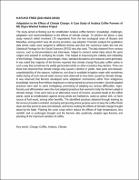| dc.description.abstract | KAFUKO FRED (2010-M152-20018)
Adaptation to the Effects of Climate Change: A Case Study of Arabica Coffee Farmers of Mt. Elgon Washed Arabica Project
The study aimed at finding out the smallholder Arabica coffee farmers’ knowledge, challenges, adaptation and recommendations to the effects of climate change. To achieve the above, a case study research which involved 170 respondents from the two ecological areas of Busano and Manafwa, among which were 30 service providers, was adopted. Thematic analysis for qualitative data where codes were assigned to different themes and then the numerical codes fed into the Statistical Package for the Social Sciences (SPSS) was also used. The data obtained from various sources, such as documentations and interviews, helped to connect varied ideas about the same subject and assisted in verifying the results. This helped in improving the validity and reliability of the findings. Frequencies, percentages, mean, standard deviations and variances were generated. It was noted that majority of the farmers reported that climate change fluctuates coffee yields in such a way that sometimes the yields get boosted while on other occasions they decline. There are those that observed that climate change only caused a decline in yields. New pests and diseases, unpredictability of the seasons, hailstorms, and drop in available irrigation water with sometimes really drying of such natural water sources were observed to have been caused by climate change. It was observed that farmers developed some adaptation mechanisms either from indigenous knowledge, learning from fellow neighbours or being trained by service providers. Several adapted practices were seen to solve (mitigating, preventing of adapting to) various difficulties. Agro-forestry and afforestation were the most adapted practices that seemed to help the farmers adapt to climate change. Trees were seen as an alternative source of income, provided shade to the coffee plants, acted as windbreakers against strong winds and hailstorms, acted as carbon sink, on farm source of fuel wood, among other benefits. The identified practices obtained through training by the service providers included; stumping and pruning whose purpose were to keep the coffee fields clean and less prone to pests and diseases, and hence curbing the effects of climate change brought about by the latter. Planting the cover crops which reduce the effects of high temperatures, less rainfall, and or prolonged drought and the farmers also positively adopted agro-forestry and planting of the improved varieties of coffee.
Key words: Change, Coffee, Arabica, Climate | en_US |


